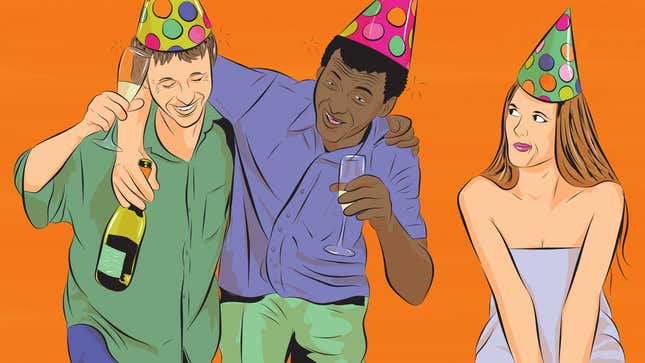
About two years ago, I quit drinking. Initially, I didn’t attempt to “mask” my teetotalism at social gatherings: I’d meet a group at a bar, never order anything, and give long-winded answers to anyone who asked why. As my friends and coworkers can attest, it can be awkward as hell being stone-cold sober in a crowd of drunkards. Or at least, I could be awkward as hell.
But after having countless boring and depressing conversations about my lack of alcohol consumption, I started adopting habits that significantly curtailed these dull interactions. While I’m certainly still pretty damn awkward about my lack of drinking sometimes, I at least don’t talk about it nearly as much. Here are some tips for making this a smoother experience for everyone involved.
Always Carry a Drink
The most obvious giveaway of teetotalism is empty hands. If you’re not holding a drink, it’s pretty much guaranteed that someone will ask you about it. If they’re nice, they’ll also offer to get you one.
If you’re feeling particularly social and end up talking to a lot of different people at the party, these questions will come up again and again, every time you introduce yourself to a new person. But there’s an easy fix that will significantly cut down questions about your allegiance to alcohol. Because if you’re carrying a drink—any drink, except maybe water—people will usually assume you’re drinking booze. Especially if you get the drink in a whisky or cocktail glass.
Bars and apartments often don’t have great lighting. And since most of the people are getting shitfaced, it’s pretty easy to make Coke look like a Cuba Libre, or make straight orange juice look like a screwdriver. When the person you’re talking to sees you drinking a beverage, he’ll assume there’s liquor in the glass. It likely won’t even occur to them that it could be otherwise, because their logic is, “What kind of weirdo would drink soda at a party?”
Avoid Your Backstory
Should someone find out that you don’t drink, try to change the subject quickly. People getting drunk at parties don’t want to hear shit about alcoholism, health risks, religious beliefs, or whatever other reason that led you to abstain from alcohol.
Of course, when people find out you don’t drink, they’ll inevitably ask, “Why not?” But understand, this is just a reflexive response. Usually they don’t actually give a fuck about why you don’t drink. Just give them a cliché response like “I’m not drinking tonight,” or “I need to cut back,” or “I’m driving,” and then quickly start jabbering about some other nonsensical thing to distract them. (Did you know an X-Files spinoff predicted 911?!?! The truth is out there, man.)
There are exceptions to this guideline. If you plan on consistently seeing this person in the future, go ahead and give them the backstory, once, so they don’t keep wondering. For example, it’s good for coworkers to know you never drink—that way, they don’t keep offering you booze at every work party.
Accept Free Drinks
Sometimes people are really nice and hand out free drinks. Don’t be a dick about it.
Just take the drink and see if you can give it to someone else without anyone noticing. There’s usually some person at the party who would love to have an additional unit of alcohol at no cost. If no one takes the drink, just set it down somewhere. If you absolutely must, pour it down a drain. Wasting booze is better for everyone than wasting any more of their time.
Go Ahead and Taste a Little
When people make their own wine or beer, they often insist everyone try it. So take a tiny sip. It won’t damage your health, renew addiction, or send you to hell. But if you’re that worried, just pretend to sip by letting the liquid merely touch your lips.
If you refuse to drink someone’s homemade booze, an annoying passive-aggressive exchange might ensue, and it’s best to avoid that shit.
Don’t Gloat
While not drinking can sometimes suck when everyone else is getting buzzed and you’re not, avoiding alcohol also has many benefits. Do not bring up these benefits.
The only time you should mention the benefits of not drinking is when someone feels bad for you that you don’t drink. If you show them you prefer to not drink, and that there are good things about not drinking, they’ll feel less bad for you and quit consoling you. But if no one is consoling you, keep your mouth shut about the pros of your abstinence.
Sure, you’re probably going to sleep better than everyone else, perform at a higher level sexually, feel great in the morning, save money, and be more productive the next day. The benefits of not drinking are fantastic, and you’ll need those incentives to motivate yourself to stay clean. But if you keep blabbering about the superiority of your life choices, you’re going to be not drinking at fewer and fewer parties.
Ross Benes has written for the Wall Street Journal, Esquire, Quartz, and Slate. He’s working on a book about the indirect relationships between sex and economics, politics, and religion.
Lead image by Sam Woolley.